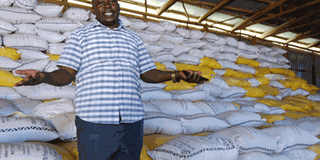Govt secures Shs129b for rice farmers in Bugiri, Bugweri

Mr Abdul Karim Kateeba, the chairperson of Namutumba Rice Farmers’ Group, stands inside a warehouse containing tonnes of rice in Jinja City on September 23, 2020. PHOTO/PHILIP WAFULA
What you need to know:
- The funds will be used to dig a dam that will supply water, compensate the affected, provide fertilisers and quality seedlings to farmers.
At least 9,000 rice farmers in Bugiri and Bugweri are set to benefit from Shs129b funding secured by government to improve production of the cereal.
Mr Aggrey Bagiire, the State minister for Agriculture, at the weekend said the project will cover 5,500 acres of the Igogero swamp.
“The funds will be used to dig a dam that will supply water, compensate those who have been affected by the project, provide fertilisers and quality seedlings to farmers, among others,” he said, adding that the farmers should not be worried that the government intends to take over the swamp.
Mr Bagiire said soil consultants would carry out tests to identify the exact seedlings and fertilisers to be used.
He added: “As government, we want to improve rice production in the Busoga Sub-region so that people can improve their household income.”
Mr Bagiire, who was meeting leaders of both districts, said construction of the dam will start before the end of the year and urged farmers to work closely with the contractors to ensure better service delivery.
He also warned the contractors against misuse of funds and urged them to employ locals.
The development comes after more than 1,060 rice growers from Kamuli, Kaliro, Luuka and Namutumba districts in Busoga said they were stranded with tonnes of rice following the proliferation of cheap rice from Tanzania.
As a result, the rice remains in secluded warehouses, one being OBN Produce and Supply Company Limited in Walukuba, Walukuba-Masese Division in Jinja City.
Mr Twaha Mugoya, the chairperson of Namutumba Rice Farmers Group, which boasts of about 50 rice growers, in an earlier interview with Daily Monitor, said Tanzanian Kaiso rice had flooded the market and was pushing them out of business.
This is because large-scale commercial rice farmers are only willing to offer them up to Shs1,800 for their rice per kilogramme instead of Shs2,000; but are willing to pay up to Shs2,000 for a kilogramme of Tanzanian rice.
Mr Peter Abongo, the project coordinator, said the scheme identified as Enhancing National Food Security Through increased Rice Production, has drawn officials from different ministries, including Water and Environment, and Agriculture.
“There is ready market for the rice; the farmers should simply embrace the project whose funds were secured through credit from Islamic Development Bank,” he said.
Mr Deo Kalanzi, an environment officer from the Ministry of Water and Environment, however, warned landlords against accessing land titles on wetlands.
Mr Kalanzi said the landlords and other users must have permits before utilising the wetlands at a cost of Shs150,000 annually.
He also warned of operations countrywide aimed at arresting farmers and sand miners without permits from National Environment Management Authority.
Ms Eva Nampina Nanangwe, the district councillor, representing Buluguyi, said there is a need to sensitise the community before the project starts.
She noted that some of the trading centres, including Muwayo, Buwuni, Busowa, Namayemba and Bugiri Town are being developed because of rice farming.




